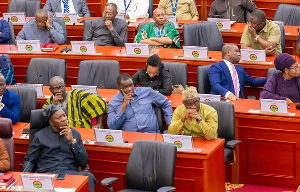GNA Feature by Francis Ameyibor
Accra, Nov. 21, GNA – “Open Sesame: Looking for the Right to information in the commonwealth,” was how the Right to Information initiative was given birth to and captured the attention of the world.
It all started in 2003 when the Commonwealth Human Rights Initiative (CHRI) submitted a report to the Commonwealth Heads of Government Meeting in Abuja on the Right to Information.
The meeting hovered around: “Problems that impede development and democracy in the Commonwealth.”
The report identified four common problems that impede development and democracy in the Commonwealth including: inequality of power between government and the citizen; lack of accountability; impunity of politicians and public officials; and the exclusion of the public from participating in issues that affect their lives.
A Commonwealth Foundation Study in 1999, which sought the view of some 10,000 citizens in more than 47 Commonwealth countries, showed growing disillusionment of the citizens with their government saying that “citizens are suspicious of the motives and intentions of their elected representatives.
Furthermore, the failure of many poverty reduction policies point to the fact that they have been designed behind closed doors by governments, who consulted with experts, but shut out the very people they were supposed to benefit.
The CHRI Open Sesame Report draws attention to the fact that a liberal freedom of information regime guaranteed by law provides one practical answer to the Commonwealth’s present search for deeper democracy and people centred development.
Freedom of information legislation within this context ensures the exercise of access to information which is based on the two core concepts of the right and ability of the
public to request for information and the duty of government to provide information, both proactively and on request.
RTI UNDERPINS ALL OTHER HUMAN RIGHTS
Freedom of information is a human right guaranteed under international law. It underpins all other human rights and is essential for good governance, democracy and development.
At the outset, it is worth considering the multiple benefits of an effective right to information regime in detail.
It strengthens democracy: The foundation of democracy is an informed constituency that is able to thoughtfully choose its representatives on the basis of the strength of their
record and that is able to hold their government accountable for the policies and decisions it promulgates.
The right to information has a crucial role in ensuring that citizens are better informed about the people they are electing and their activities whiles in government.
Democracy is enhanced when people meaningfully engage with their institutions of governance and form their judgments on the basis of facts and evidence, rather than just empty promises and meaningless political slogans.
It supports participatory development since much of the failure of development strategies to date is attributable to the fact that, for years, they were designed and implemented in a closed environment – between governments and donors and
Without the involvement of people.
If governments are obligated to provide information, people can be empowered to more meaningfully determine their own development destinies.
They can assess why development strategies have gone askew and press for changes to put development back on track.
RTI AS A PROVEN ANTI-CORRUPTION TOOL
In 2003, of the 10 countries scoring best in Transparency International’s annual Corruption Perceptions Index, no fewer than nine had effective legislation enabling the public to see government files.
In contrast, of the 10 countries perceived to be the worst in terms of corruption, not even one had a functioning access to information regime. The right to information
increases transparency by opening up public and private decision-making processes to scrutiny.
It supports economic development since the right of information provides crucial support to the market-friendly, good governance principles of transparency and accountability.
Markets, like governments, do not function well in secret. Openness encourages political and economic environment more conducive to the free market tenets of ‘perfect information’ and ‘perfect competition’.
In turn, this result in stronger growth, because it encourages greater investor confidence. Economic equity is also conditional upon freely accessible information
because a right of information ensures that information itself
does not become just another commodity that is corralled and cornered by the few for sole benefit.
RTI AS A TOOL FOR ENHANCING DEMOCRACY AND NATIONAL STABILITY
It helps reduce conflict: Democracy and national stability are enhanced by policies of openness, which engender greater public trust in representatives.
Importantly, enhancing people’s trust in their government minimises the likelihood of conflict.
Openness and information-sharing contribute to national stability by establishing a two-way dialogue between citizens and the state, reducing distance between government and the people and thereby combating feelings of alienation.
System that enable people to be part of, and personally scrutinize, decision-making processes reduce citizens’ feelings of powerlessness and weakens perceptions of exclusion or unfair advantage of one group over another.
Unfortunately, in today’s Commonwealth, there is a ‘poverty of information’ because there is still a large stockpile of information which is lying with government, deliberately held away from the people because of the assumption that information is secret.
The culture of secrecy is further entrenched by legislation including State Secrets Acts, Security and Intelligence Acts, Official Secret Acts etc.
The Prisons Act (1960) of Tanzania for instance restricts comment by the media
or members of the public on the prison system.
The Nigerian Official Secrets Acts (1962) makes provisions on the circumstances under which access to official information may be restricted.
Unfortunately, following the September 11 attacks on the US and the subsequent invasion of Iraq, many countries have tightened the screw on information accessible to the public through new anti-terrorism laws which impose stricter limits on what government information will be released.
It is troubling that new counter-terrorism laws have the potential to have an unwarranted negative effect on access to and dissemination of information.
It is of particular note that the ability and capacity of the media to act effectively as the fourth estate of the realm holding governments accountable and acting in public
interest and facilitating access to and dissemination of information could be compromised.
Through counter-terrorism legislation, states indirectly exercise a form of control over the media’s dissemination of information to the public.
Governments are faced with the dilemma of achieving a fair balance between national
security and the rights of citizens. This dilemma raises fundamental issues related to entrenching constitutionalism and the rule of law vis a vis the powers of government.
FREEDOM OF INFORMATION LEGISLATION IN THE COMMONWEALTH
Freedom of information legislation is an ideal legal mechanism for entrenching access to information throughout the Commonwealth. Such legislation has been recognised
internationally for nearly 250 years.
The world’s first FOI law Sweden’s freedom of the press Act of 1789, the French declaration of the Rights of Man called for the Rights of citizens to review expenditures of governments.
In 1888, Colombia’s Code of Political and Municipal Organisations allowed individuals request documents held by government agencies or in government archives.
Following the adoption of the Universal Declaration on Human Rights, Finland enacted its FOI Law in 1951, the United States in 1966, France in 1978, Canada, Australia and New Zealand in 1983.
In the last 15 years or so, as the democratisation wave overtook Eastern Europe, a large number of countries adopted FOI Legislation. The movement has also taken strong roots in Asia and South America in recent years.
The importance of freedom of information has been recognised by the Commonwealth for more than two decades. In 1980, the Commonwealth Law Ministers’ Meeting recognised that official information needs to be accessible for the public to participate in the democratisation process.
Ghana as a pioneer in modern day African democratic development continue to delay for the passage of the Freedom of Information Bills.
It is moral and legislatively normal for other African countries to set the pace for Ghana.
Opinions of Wednesday, 23 November 2011
Columnist: Ameyibor, Francis














